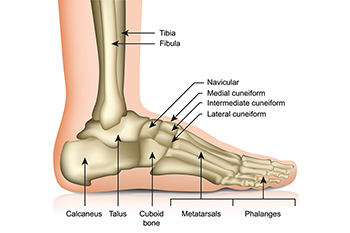
Foot stress fractures are tiny cracks in the bones resulting from repetitive force or overuse. These fractures, often seen in the metatarsal bones of the foot, can be subtle but carry the potential for significant discomfort and impairment if not addressed promptly. Risk factors contributing to the development of foot stress fractures are multifaceted. High-impact activities, such as running or jumping, increase the repetitive stress on the bones, making athletes more susceptible. Inadequate footwear or sudden increases in activity levels can also elevate the risk. Conditions like osteoporosis, which weakens bone density, may exacerbate the susceptibility to stress fractures. Nutritional deficiencies, particularly in calcium and vitamin D, compromise bone strength and resilience. Understanding both the definition and the spectrum of risk factors associated with foot stress fractures enables individuals to make informed choices about their physical activities, footwear, and overall bone health. If you have endured a stress fracture, it is suggested that you visit a podiatrist who can effectively treat this condition.
Stress fractures occur when there is a tiny crack within a bone. To learn more, contact one of our podiatrists from Comprehensive Foot & Ankle Center. Our doctors can provide the care you need to keep you pain free and on your feet.
How Are They Caused?
Stress fractures are the result of repetitive force being placed on the bone. Since the lower leg and feet often carry most of the body’s weight, stress fractures are likely to occur in these areas. If you rush into a new exercise, you are more likely to develop a stress fracture since you are starting too much, too soon. Pain resulting from stress fractures may go unnoticed at first, however it may start to worsen over time.
Risk Factors
- Gender – They are more commonly found in women compared to men.
- Foot Problems – People with unusual arches in their feet are more likely to develop stress fractures.
- Certain Sports – Dancers, gymnasts, tennis players, runners, and basketball players are more likely to develop stress fractures.
- Lack of Nutrients – A lack of vitamin D and calcium may weaken the bones and make you more prone to stress fractures
- Weak Bones – Osteoporosis can weaken the bones therefore resulting in stress fractures
Stress fractures do not always heal properly, so it is important that you seek help from a podiatrist if you suspect you may have one. Ignoring your stress fracture may cause it to worsen, and you may develop chronic pain as well as additional fractures.
If you have any questions, please feel free to contact our offices located in Lehigh Ave and Nazareth Hospital in Philadelphia, Collegeville Darby, and Langhorne, PA . We offer the newest diagnostic and treatment technologies for all your foot care needs.
